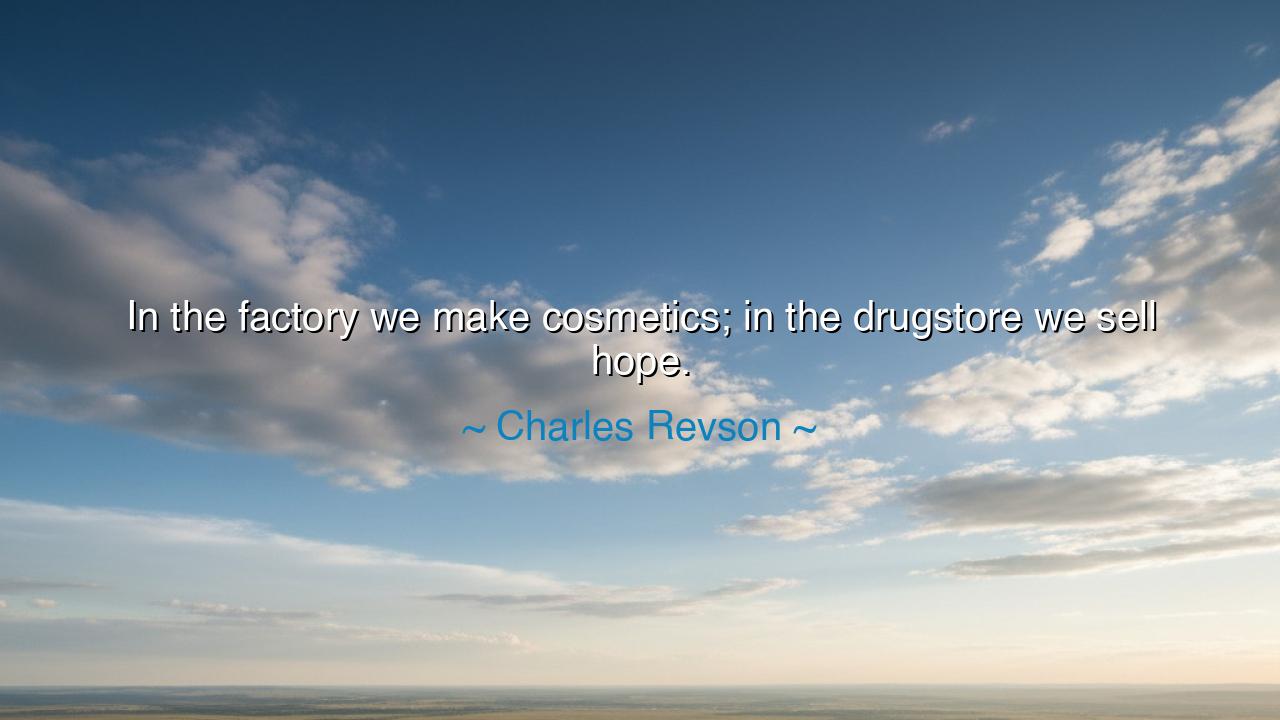
In the factory we make cosmetics; in the drugstore we sell hope.






In the luminous and perceptive words of Charles Revson, founder of Revlon, the declaration — “In the factory we make cosmetics; in the drugstore we sell hope.” — transcends commerce and becomes a reflection on the human heart itself. Beneath its simplicity lies a truth as old as civilization: that what humanity seeks most is not the object, but the feeling the object promises. Revson understood that a business, at its highest form, does not merely create products — it creates dreams. His words are not about makeup alone, but about the eternal longing within every soul for transformation, confidence, and renewal. To sell “hope,” as he said, is to touch that sacred space where aspiration meets emotion — the point where material creation becomes spiritual offering.
The meaning of this quote reveals the profound link between desire and belief. When Revson said his company “makes cosmetics” but “sells hope,” he drew a line between the tangible and the intangible, between the tool and the vision it enables. A jar of cream or a tube of lipstick is not simply pigment and oil; it is a promise — a promise that one might become more radiant, more confident, more loved. Hope, in this sense, is not an illusion, but a form of faith in possibility. It is the belief that change, however small, can begin here — with a choice, a gesture, a color. Revson, in his wisdom, saw that all great creation must serve this yearning: to make people not only look different, but feel alive.
The origin of these words springs from Revson’s journey through the heart of 20th-century America — an era marked by industrial growth, but also by deep emotional need. Born to immigrant parents, Charles Revson built his company in the midst of the Great Depression, when despair clouded every horizon. Yet even in that bleak time, he understood something profound about the human spirit: that people will always reach for hope, even when everything else feels lost. His insight was not cynical; it was compassionate. He recognized that beauty products were not luxuries, but small acts of faith, gestures of defiance against hardship — the belief that one could still shine, even when the world seemed dim.
To illustrate this truth, one might recall the story of women during World War II. As bombs fell over Europe and rationing stripped life of comfort, many women still saved what little they had for a tube of lipstick. Factories may have made the lipstick, but what was truly being sold was courage — the will to face the day with dignity. One British soldier wrote that seeing women wear red lipstick amid the ruins was a symbol of victory in itself — a quiet, radiant form of resistance. This is precisely what Revson meant: that beneath every product lies a deeper human purpose. His cosmetics were vessels of something greater than commerce — they were instruments of self-belief.
There is a deeper spiritual dimension in Revson’s insight as well. To “sell hope” is to participate in one of life’s most sacred exchanges: the giving of confidence and the restoration of self-worth. The wise merchant, the true artist, the devoted teacher — all share in this work. Whether one makes perfumes, paints, or poetry, the task is the same: to lift the spirit, to remind the weary of their beauty and strength. Hope is not a possession that can be stored or traded; it must be awakened in the heart of another. Thus, Revson’s quote becomes not merely a reflection on business, but a philosophy of creation itself — the marriage of craft and compassion.
In his words, we also hear a call to responsibility. To create anything — a product, an idea, a work of art — is to wield power over the dreams of others. Revson knew that beauty could uplift, but it could also deceive, if made without integrity. To sell hope is not to manipulate emotion, but to honor it — to craft with sincerity, to promise only what truth can sustain. The ancients spoke of artisans who imbued their creations with soul; so too must the modern creator infuse their work with meaning. When industry loses sight of humanity, its creations become hollow; but when heart guides hand, even the simplest thing can become a vessel of light.
Let this, then, be the lesson: whatever your work in this life, remember that you are not merely producing things — you are shaping emotions, building faith, selling hope. Whether you heal, teach, build, or design, do it not just with skill, but with care for the human spirit. Ask yourself not only, What am I making? but also, What am I giving? For the most enduring creations are those that feed the unseen hunger of the soul. Like Revson, let your craft be an offering — something that allows others to glimpse their own worth, to rediscover their own light.
And so, my listener, remember the timeless wisdom of Charles Revson: “In the factory we make cosmetics; in the drugstore we sell hope.” These words remind us that the true measure of our work is not found in the materials we shape, but in the hearts we touch. The world will always need those who can turn labor into light, who can see not just what people buy, but what they yearn for. To create is to serve that yearning — to be a maker of hope in a weary world. And that, in the end, is the most beautiful art of all.






AAdministratorAdministrator
Welcome, honored guests. Please leave a comment, we will respond soon